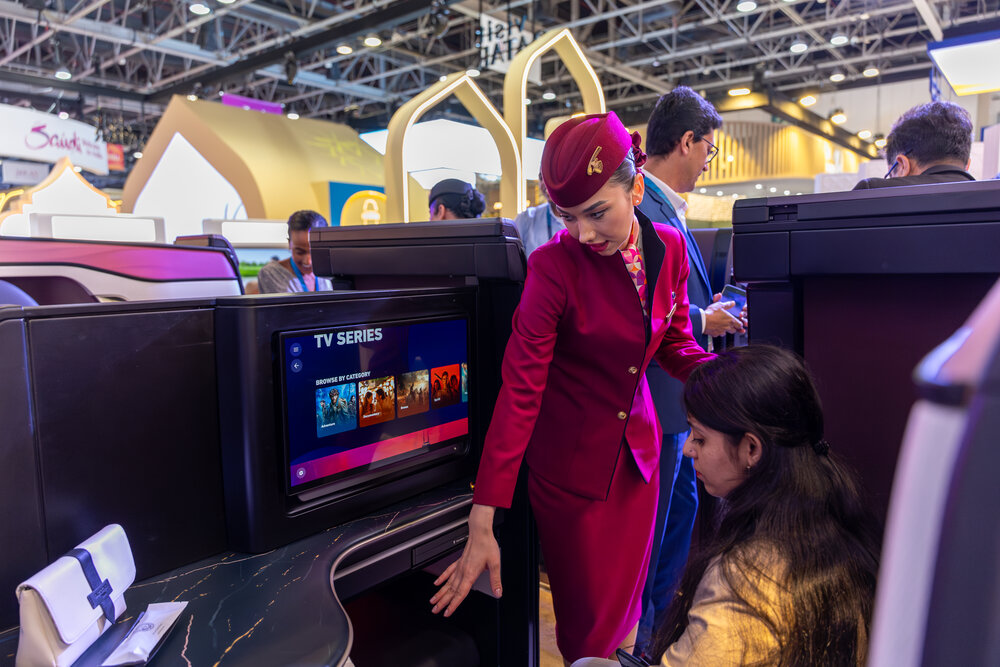
Qatar Airways, acclaimed as the World’s Best Airline by Skytrax in 2024, made a powerful statement on the opening day of Arabian Travel Market (ATM) Dubai 2025, unveiling a suite of industry-leading digital and experiential innovations designed to redefine the future of air travel. At the heart of the airline’s showcase was the debut of Sama, the world’s first AI-powered digital human cabin crew, now with advanced Arabic-speaking capabilities.
-1064b2-large-1745848819.jpeg)
Sama, whose name means ‘sky’ in Arabic, is powered by UneeQ-a New Zealand-based leader in intelligent digital human interfaces-and is designed to engage with passengers in both Arabic dialects and Modern Standard Arabic, offering a uniquely personalized and culturally attuned travel experience.
Sama’s new role extends beyond ATM, as she is now accessible across Qatar Airways’ digital ecosystem, including the award-winning mobile app and the immersive QVerse web platform. Travelers can interact with Sama through voice and chat, receiving real-time assistance with flight bookings, destination recommendations, and personalized itineraries.

Sama’s AI is also emotionally aware, capable of interpreting user moods to suggest the perfect holiday destination, marking a significant leap in the field of emotionally intelligent AI assistants. Beyond the booking process, Sama has become a social media ambassador, engaging a global audience on Instagram (@SamaOnTheMove) with travel tips, behind-the-scenes stories, and insights into the airline’s operations, further humanizing the brand and connecting with digitally native travelers.
-4f6fa6-large-1745848821.jpeg)
Qatar Airways’ ATM stand also introduced The ORCHARD, a hyper-realistic virtual recreation of the iconic indoor garden at Hamad International Airport, allowing visitors to explore and preview the tranquil, nature-inspired environment in immersive VR. This experience is designed to make the unfamiliar feel familiar, setting a new standard for digital engagement in travel.
A major highlight was the Qsuite Next Gen, the latest evolution of Qatar Airways’ award-winning business class. The new suites feature fully customizable Quad and Companion Suites, movable 4K OLED Panasonic Astrova in-flight entertainment screens, increased dining space, taller digitally controlled privacy dividers, ambient lighting, and a dedicated ‘Make My Bed’ button for a 5-star turn-down service.
-1dc918-large-1745931196.jpg)
These innovations are set to debut on the Boeing B777-9 aircraft, offering passengers unprecedented levels of comfort, privacy, and connectivity. Complementing the Qsuite Next Gen was a multi-sensory pod, which brought the suite’s atmosphere to life through visuals, sound, scent, and motion, providing a fully immersive preview of the onboard experience.
Qatar Airways also announced expanded flight frequencies to key destinations, including Dar Es Salaam, Kilimanjaro, Entebbe, Tokyo Narita, Maputo–Durban, Larnaca, Trabzon, Sharjah, Manchester, Madrid, Lisbon, and London Heathrow for the peak summer season. In parallel, the airline signed new Memoranda of Understanding with Visit Maldives and Indonesia’s Ministry of Tourism to boost visitor arrivals and explore new tourism promotion opportunities via Hamad International Airport.
-43a0e0-large-1745931200.jpg)
Additionally, the airline revealed that more than half of its Boeing 777 fleet now features Starlink’s high-speed Wi-Fi, with plans to equip all wide-body aircraft by the end of 2025, ensuring seamless connectivity for passengers.
Qatar Airways Group Chief Executive Officer, Engr. Badr Mohammed Al-Meer, emphasized the airline’s commitment to innovation and regional relevance: “We are proud to return to ATM with industry innovations that reflect the diversity and spirit of our region. Sama, The ORCHARD in VR, Qsuite Next Gen, and our multi-sensory pod are all part of how Qatar Airways is shaping a future of travel that is not only digital, but also deeply human.”
-53bb50-large-1745931198.jpg)
Visitors can experience these innovations firsthand at Qatar Airways’ stand ME1420, located between Halls 3 and 4 at the Dubai World Trade Centre, until May 1, 2025. Through these advancements, Qatar Airways continues to set new benchmarks in digital transformation, personalized service, and customer engagement, reaffirming its leadership in the global aviation industry.

.jpg)
.jpg)
.jpg)

.jpg)
.jpg)
.jpg)
.jpg)
.jpg)

.jpg)
.jpg)



.jpg)

 (1).jpg)
.jpg)
.jpg)
.jpg)
.jpg)
.jpg)
.jpg)
.jpg)
.png)
.jpg)
.jpg)

.jpg)
 (1).jpg)
.jpg)

.jpg)

.jpg)
.jpg)
.jpg)
.png)
.jpg)
.jpg)

 (1).jpg)


.jpg)
.jpg)
.jpg)


.jpg)
.jpg)

.jpg)
.jpg)
.jpg)
